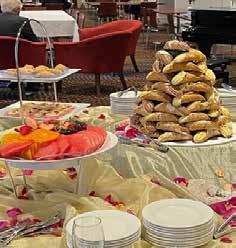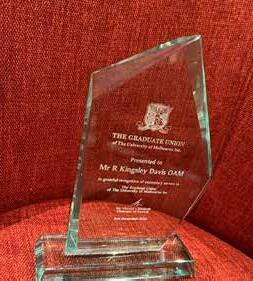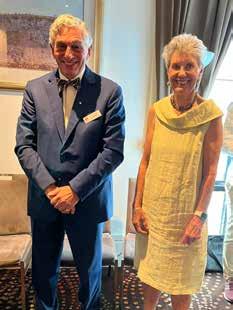
6 minute read
The myth of sovereignty Sovereignty has never passed to the Crown
by Life member Louis Coutts
For nearly two hundred years since the proclamation of sovereignty over this country by Captain Cook in 1770 on behalf of George III in England, the legal and constitutional institutions of this country were underpinned by a false and misinformed legal fiction. It was claimed for nearly two hundred years, that despite all the evidence, this land was unoccupied in 1770 and again in 1788 on the arrival of the First Fleet. And this, despite the fact that Europeans had engaged with the native population as early as the 17th Century. In fact, Captain Cook, after the so called discovery of this country, sailed North along its shores and constantly encountered the inhabitants of this land. Sir Joseph Banks, who sailed with Cook, constructed a crude dictionary of Aboriginal words on this journey north of engagement with the local population.
Advertisement
But this recognition of occupation by native people created a problem for those in England who, initially, wanted to use this land as a prison. International law and English Common law at the time provided (and still does) that a foreign power could only exercise sovereignty over newly discovered territory if it was unoccupied. Thanks to the ingenuity of people called “Law Lords” on the Privy Council in England, that problem was quickly solved. Language found its way into our laws that were used to ignore the existence of the original inhabitants. Words such as “savages”, “barbaric”, “uncivilised”, “Lower order of people” and “Incapable of understanding or benefiting from civilised law and totally incapable of any system of laws” crept into the judicial language of the Law Lords on the Privy Council. As such, it was inconceivable to the Colonial Office in London and to the Law Lords that this country could be considered occupied in 1770. The so called occupants were just a bunch of savages. Indeed, that is the word used to describe them in the first text book published on Australian Constitutional law.
As the new boat people swelled across the country and formed separate colonies, there were murmurings for something grander and people started to talk about a Federal System that brought all the colonies together under one local roof, rather than the oversight of the Colonial Office. These murmurings resulted in a series of conventions in the later part of the 19th century which in turn resulted in the adoption of a constitution in 1900. Either sensitive to the fact that the country might have been occupied in 1770, or aware of the necessity to prolong the fiction, the Constitution perpetuated the myth. It included two clauses pertaining to the original inhabitants. Firstly, it forbade the Federal Parliament from passing laws in relation to the Aboriginal population and secondly, it provided that in counting the population of the country, no account was to be taken of the Aboriginal population. The fiction of Terra Nullius was enshrined in our Constitution and perpetuated until 1967.
Archaeologists started fossicking around in the middle of the last century revealing a new and profoundly disturbing image of the society of indigenous people that ran counter to the awful “savages” characterisation. In 1968 the remains of an aboriginal woman were discovered at Lake Mungo in New South Wales and carbon dated to approximately 30,000 years. And then, little by little, the history of this country pre 1770 started to emerge. For perhaps 60,000 years, this country was occupied by a sophisticated people, with their own laws, spirituality, religion and economic management. They had cared for the country over that period of time and lived within their cultural environment. It seems that one of the basic elements of their spirituality was the land from which they came and to which they would return on death. Their land was as sacred to them as the Christian Churches are to religious people today and we had wiped them out.
Thus was exposed the frailty of the legal fiction that has supported and justified everything that the newcomer had done in this country in the name of the Crown for two hundred years and wrongly proclaimed sovereignty over these people and had taken possession of their sacred land.
This frailty didn’t go unnoticed by the original people and thus began attempts to persuade our Courts to recognise the true reality of their situation and that they were the long term occupiers of this country at the time of Captain Cook when they were the sovereign people of this land and that they had never surrendered sovereignty to the English Crown.
Powerful though the argument was, the indigenous people were at a disadvantage in that they were arguing their case in our Court system and constrained by English law which held indigenous law in disdain.
It came to the nitty gritty when an Aboriginal lawyer by the name of Paul Coe, sued the British and Australian governments for a declaration that sovereignty never passed to the Crown because at the time of Captain Cook’s proclamation and the arrival of the First Fleet, the country was occupied and had been occupied for tens of thousands of years by people with their own laws and civilisation.
Faced with the persuasive logic of this argument, one of the Judges who delivered the majority judgement of the Court, resorted to ridiculing Mr Coe and then simply saying to him “You cannot argue this issue in our Courts and that is that.” His reasoning, in one sentence was that the proclamation of sovereignty was an “Act of State” that cannot be challenged in our Courts.
In the heroic case of Mabo, Brennan J in delivering the majority judgement said the same things. But either the High Court judges didn’t do their homework, or if they did, they conveniently overlooked what they would have learnt.
I have done the homework and this is what I have discovered. In 1791 a case reached the Privy Council in London. The Privy Council was the last Court of Appeal from the colonies and India and made up of Law Lords from the House of Lords. The Nabob of Canatic complained that he had been robbed by the East India company and wanted the Court to order that accounts be taken of his financial relationships with the company in order to establish whether or not he had been robbed.
What had happened was the Nabob had entered into an agreement with the Company for his protection and in return, he promised to pay the company the cost of protection. After a while, he ran out of cash and couldn’t pay. The company came to his salvation by suggesting that its employees would lend him the money that he could then use to pay his debt to the Company. But the employees wanted security so he mortgaged farms and ultimately the employees forced the farmers off the land and sold it at a profit while charging the Nabob exorbitant interest rates. Things got really bad and the employees, when approached for new loans insisted that the Nabob first pay interest on the money proposed to be lent for two years when they would then advance the principal.
At one stage, the debt was calculated at something like Four hundred thousand pounds of which, not one penny had been advanced to the Nabob. The scandal reached Parliament and Edmund Burke denounced the company and its employees for participating in one of the worst rackets in the country’s history.
But this did not deter the Privy Council which was in the pockets of the company. According to the Privy Council the dispute between the Nabob and the company arose out of a treaty between two sovereign people and therefore was an “Act of State” that could not be challenged in an English Court.
This Act of State doctrine then had a life of its own during the 19th century when in case after case of challenges to the theft by the East India Company, the Privy Council denied the Indians the right to have their cases heard. Daylight robbery, breaking and entering and simply welching on contracts were denied judicial scrutiny on the basis that they were Acts of State and not judiciable in English Courts.
By 1970, the Court of Appeal in England had had enough and when invited to follow these decisions, it refused to do so. But come Mr Coe’s case in 1979 and Mr Mabo’s case in 1992, the High Court used the flawed fiction of “Act of State” to deny the indigenous people the right to challenge sovereignty.
Apart from the clear unsustainability of the argument, there is one glaring weakness which has been overlooked. If we go back to the origins of this so called doctrine of Act of State in 1791 it will be seen that to invoke it, it has to be established that there was a treaty between two sovereign people. So, to pull this trick on the indigenous people, the Court is hoist on its own petard. There is no treaty, so that rules out one plank of the argument. And then there is the other plank of the necessity to recognise that there are two sovereign people. In other words, to pull the stunt of “Act of State” on the indigenous people, the government would have to concede that the indigenous claimants were the descendants of sovereign people and that becomes legal check mate.
Sovereignty has never passed to the crown over this country or its original inhabitants.













